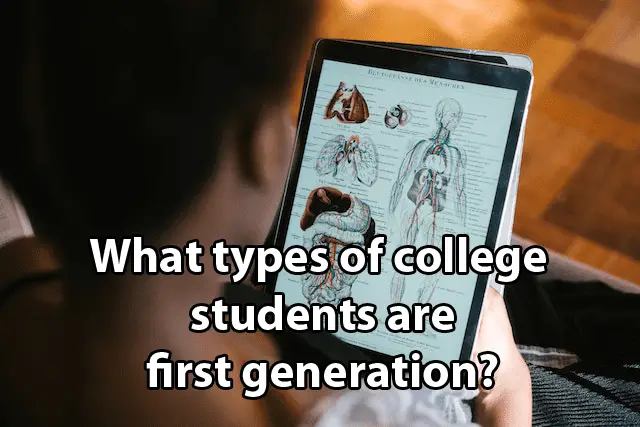
Breaking Barriers: Financial Aid Pathways for First-Generation College Students
College education can be a transformative experience, opening doors to numerous opportunities and career paths. However, the financial burden often associated with higher education can be a significant barrier, particularly for first-generation college students. But breaking this barrier is possible through various financial aid pathways tailored to support these students in their academic pursuits.
Firstly, it’s essential to acknowledge the unique challenges faced by first-generation college students. Many come from low-income families with limited financial literacy and resources, making it difficult to fund their education independently. Understanding this context lays the foundation for exploring the financial aids available, which include grants, scholarships, and merit-based tuition discounts.
Grants: A Foundation of Support
Grants are one of the primary sources of financial aid for college students and are typically awarded based on financial need. These funds don’t need to be repaid, making them extremely valuable. The Federal Pell Grant is one such option, providing substantial assistance to undergraduates who exhibit exceptional financial need.
Beyond federal grants, institutions may offer additional need-based grants to first-generation college students. These grants are crucial as they ease the financial load, allowing students to focus more on their studies rather than finances.
Breaking Barriers: Scholarships Available to First-Generation Students
Scholarships form another critical component of the financial aid landscape. They are particularly vital for first-generation students aiming to reduce their college expenses without accumulating debt. Many scholarships are designed explicitly for first-generation students to help bridge the financial gap.
For instance, the "First Generation Matching Grant Program" is a scholarship aimed at assisting first-generation students. Offered by several universities, this program matches private donations to provide financial support to eligible students. This type of targeted scholarship helps create a more level playing field for those embarking on their college journey without familial precedent.
In addition, national and local organizations offer scholarships specifically for first-generation college students. Organizations like the "Coca-Cola First Generation Scholarship" provide funding to students demonstrating both financial need and strong academic potential. These scholarships not only provide financial relief but also recognize the accomplishments and potential of first-generation students.
Merit-Based Tuition Discounts
In addition to need-based financial aid, first-generation students may benefit from merit-based tuition discounts. While these discounts are generally awarded based on academic achievements, many institutions consider first-generation status when determining eligibility.
Merit-based tuition discounts can significantly reduce the cost of education for students who demonstrate outstanding academic performance or other talents. Some colleges provide automatic consideration for these discounts upon admission, while others may require a separate application process.
Institutions may also offer leadership scholarships or discounts for students involved in extracurricular activities. This additional support can be an incentive for first-generation students who excel in various areas, further reducing their financial burden.
Work-Study Programs: Earning While Learning
Another option available to first-generation college students is the federal work-study program. This initiative enables students to work part-time, often in jobs related to their field of study, thereby earning money to help cover their educational expenses.
Work-study programs not only provide financial support but also offer valuable work experience. This experience can be particularly beneficial for first-generation students who may need to balance multiple commitments, such as family responsibilities and academics. By participating in these programs, students can gain practical skills while reducing their reliance on student loans.
Navigating Financial Literacy Programs
Understanding financial aid options is critical for first-generation students, who may face challenges in navigating the intricacies of college financing. Many institutions now offer financial literacy programs designed to help students comprehend various aspects of their education funding.
These programs cover topics such as budgeting, managing student loans, and understanding financial aid packages. Equipping first-generation students with this knowledge empowers them to make informed decisions about their education and finances, laying a solid groundwork for their college success.
Peer and Mentorship Support
Financial aid is just one piece of the puzzle. For first-generation college students, having access to peer and mentorship support can be invaluable in navigating their academic journey. Mentors, who may themselves be first-generation graduates, can provide guidance, encouragement, and practical advice on managing both college life and financial responsibilities.
Peer networks can also offer social support, helping students feel connected and less isolated in their college experience. These communities often share resources and strategies on accessing financial aid, creating a broader support system for first-generation students.
Leveraging Online Resources
In today’s digital age, numerous online resources are available to assist first-generation college students in understanding and securing financial aid. Websites such as the National Association of Student Financial Aid Administrators (NASFAA) provide comprehensive guides and tools to help students navigate financial aid applications and scholarships.
Furthermore, social media platforms and online communities can connect students with others going through similar experiences. Sharing insights and success stories can inspire first-generation students to pursue all available financial aid opportunies actively.
Breaking the Stigma
While financial aid is crucial, breaking the psychological barriers faced by first-generation college students is equally important. These students may battle self-doubt or feel undeserving of the opportunities available to them. Through financial support programs, educational institutions play a significant role in affirming their value and potential.
Encouraging a narrative of empowerment and achievement helps dismantle these barriers, showing first-generation students that they deserve, and can indeed succeed, in higher education. This shift in mindset is supported by advocating for financial aid packages that remove obstacles and highlight strengths.
Conclusion: A Future of Opportunities
Breaking barriers in higher education requires concerted efforts at many levels. For first-generation college students, financial aid pathways such as grants, scholarships, merit-based tuition discounts, and work-study programs are crucial in making their college dreams a reality. By navigating these opportunities with awareness and support from mentors and peers, these students can overcome financial hurdles and embrace the college experience.
This multifaceted approach helps ensure that first-generation students are not alone in their journey. Instead, they are empowered to excel academically and personally, fostering inclusion and equity within the higher education system. In this way, financial aid pathways do more than support individual students—they contribute to creating a future rich with diverse voices, perspectives, and leaders.

















